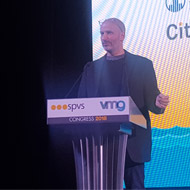We Bought a Zoo author shares his inspiring story

Benjamin Mee.
"If you give up you will definitely fail," said Dartmoor Zoo owner Benjamin Mee, as he described his family's incredible decision to buy a failing zoo and save its animals from euthanasia.
Dartmoor Zoo was on the brink of closure in 2005 and its 250 exotic animals - including lions, tigers, tapirs and a jaguar - were faced with being put to sleep.
Ben and his siblings were looking for a new home for their mother and family when they came across the 12-bedroom, 30-acre property in the South Downs of Devon. After realising they were the last hope for its resident animals, they made a decision that shocked many of their friends.
It took them six months to buy the zoo and it was a process fraught with difficulties. Alongside challenges presented by the zoo's then owner, the bank pulled their mortgage, leaving them £500,000 short of development funds.
To add to the family's struggles, Ben's wife was diagnosed with a second brain tumour in December 2006. A scan confirmed the tumour had spread to eight places and was inoperable. She passed away at the end of March 2007, just a few months before the zoo was due to open.
In the midst of the family's devastation, the zoo provided solace. Its idyllic location, the need to get up every day and care for the animals and the continuing life and death around them put everything into perspective, he says.
"We were just another family of mammals that had been affected by loss and every day it got slightly better," he explained. "There was a very important job to do to get the place open for July, otherwise it had all been for nothing."
The zoo opened as planned in July 2007 and Ben wrote a book - We Bought a Zoo - about his experiences. It was translated into 24 languages and later made into a film starring Matt Damon.
Ben now also works with Grow for Good, which allows people suffering from stress related illnesses - including ex-service men and women with post traumatic stress disorder - to garden in a zoo environment. The scheme improves physical and mental health and helps people to gain skills and self esteem.



 HMRC has invited feedback to its communications regarding the employment status of locum vets and vet nurses.
HMRC has invited feedback to its communications regarding the employment status of locum vets and vet nurses.